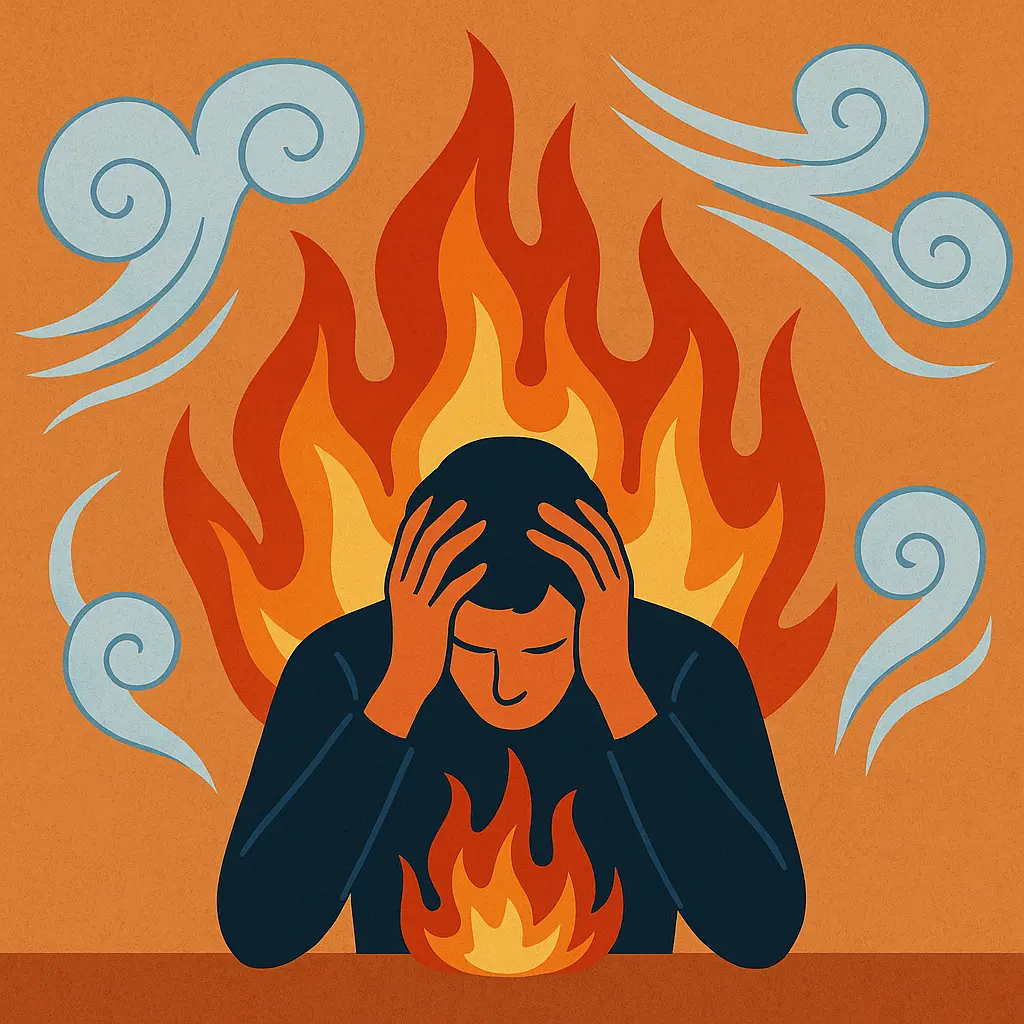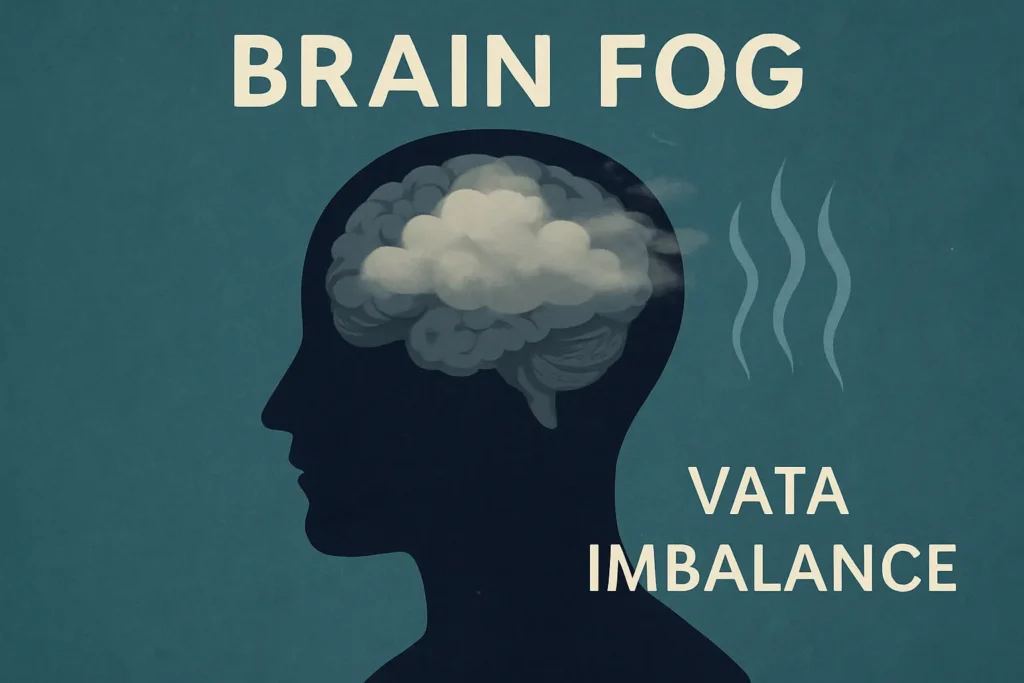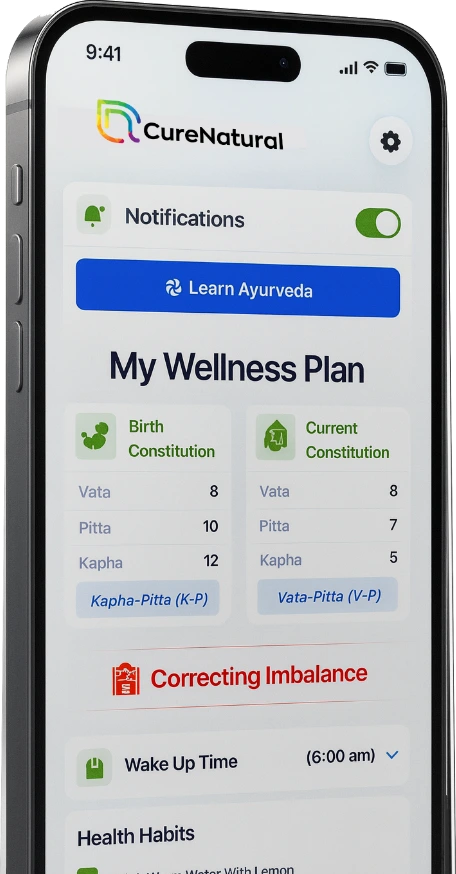Do you often feel drained and mentally foggy? The fast pace of today’s world can harm our mental and physical health. This can lead to burnout, affecting our work and life quality.
Ayurvedic medicine, from ancient India, helps prevent stress and burnout. It focuses on the body’s constitution and its three energies: Vata, Pitta, and Kapha. A vata imbalance can cause anxiety, mental fogginess, and exhaustion.
Knowing how to balance vata can help fight stress and improve focus. Ayurvedic treatments and herbs like Ashwagandha and Brahmi are known to help. They reduce stress and boost brain function.
Key Takeaways
- Ayurvedic medicine offers a holistic approach to preventing stress and burnout.
- Vata imbalance is a key factor that contributes to feelings of anxiety and exhaustion.
- Ashwagandha and Brahmi are Ayurvedic herbs known to reduce stress and improve mental clarity.
- Understanding and balancing the body’s doshas is crucial for mental well-being.
- Ayurvedic treatments can help mitigate stress and enhance cognitive function.
Understanding Burnout Through the Ayurvedic Lens
Burnout is more than just feeling tired. It’s a complex issue that Ayurveda tackles in a special way. In today’s fast world, stress and pressure can exhaust us emotionally, mentally, and physically.
The Modern Epidemic of Exhaustion
The modern world moves fast and demands a lot. This can make people feel burned out. It’s not just tiredness; it’s a deep feeling of being drained.
Burnout shows up in many ways, like constant tiredness, lack of drive, and less productivity. Knowing what causes it is key to fixing it.
How Ayurveda Views Mental and Physical Fatigue
Ayurveda, an ancient medicine, sees burnout differently. It believes mental and physical tiredness come from imbalances in our body’s energies, or doshas.
Ayurveda says sharp thinking comes from Sattva and balanced Prana Vata. When these are in balance, our minds are clear, and we have plenty of energy.
The Connection Between Energy, Metabolism, and Mental Clarity
Ayurveda links energy, metabolism, and clear thinking closely. It says a healthy metabolism, or Agni, is vital for keeping our energy and sharpness up.
If Agni is off, toxins, or ama, build up. This can make us feel foggy and tired. So, keeping our metabolic fire burning is essential to avoid burnout.
The Three Doshas: Ayurveda’s Foundation for Balance
Ayurveda is a holistic healing system that focuses on three main energies, or doshas. These are Vata, Pitta, and Kapha. They come from the five elements of nature: earth, water, fire, air, and ether. Knowing about each dosha is vital in Ayurveda to avoid health problems like burnout treatment.
Vata: The Air and Space Elements
Vata is linked to air and space. It controls movement, communication, and the nervous system. People with a lot of Vata are often creative, active, and smart.
But, too much Vata can cause anxiety, trouble sleeping, and dryness in the body.
Pitta: The Fire and Water Elements
Pitta is made up of fire and water. It handles metabolism, energy, and thinking. Those with a lot of Pitta are smart, ambitious, and warm.
But, too much Pitta can cause anger, inflammation, and feeling too hot.
Kapha: The Earth and Water Elements
Kapha is based on earth and water. It gives structure, lubrication, and nourishment. People with a lot of Kapha are calm, stable, and caring.
But, too much Kapha can lead to feeling tired, gaining weight, and being too attached.
How Dosha Imbalances Affect Your Energy
When the doshas are balanced, the body and mind work well. But, imbalances can cause problems like fatigue, stress, and burnout. For example, too much Vata can mess up sleep and cause anxiety.
Too much Pitta can lead to burnout from too much stress and competition. It’s important to understand and manage these doshas to keep energy up and avoid burnout.
Vata Imbalance: The Root Cause of Burnout
Burnout is a big problem today, and Ayurveda says it comes from Vata imbalance. Vata controls movement and communication in our bodies. When it’s off, we feel tired, anxious, and our minds get foggy.
Signs of Excess Vata in the Body and Mind
Too much Vata shows up as dry skin, constipation, and feeling anxious. It also makes us restless, fearful, and unable to focus. Spotting these signs is the first step to balance and avoiding burnout.
How Vata Disrupts Your Natural Energy Flow
Vata affects our energy flow a lot. When it’s not right, we get tired, less productive, and our immune system weakens. This messes with our physical and mental health.
The “Stealing of Fire” Phenomenon in Ayurveda
The “stealing of fire” is when Vata imbalance takes away our digestive fire (Agni). This causes bad digestion and nutrient shortages. It hurts our health and energy, making us feel burned out.
| Symptom | Vata Balanced | Vata Imbalanced |
|---|---|---|
| Skin Condition | Nourished, healthy | Dry, rough |
| Mental State | Clear, focused | Anxious, restless |
| Energy Levels | Stable, consistent | Low, variable |
Knowing and fixing Vata imbalance is crucial to stop burnout and stay healthy. By spotting the signs and acting, we can balance our Vata and handle stress better.
The Pitta-Vata Connection in Chronic Stress
Chronic stress often shows a mix of Pitta and Vata, two key energies in Ayurveda. When these are out of balance, it can cause burnout. In Ayurvedic medicine, knowing how these energies interact is key to fixing stress and fatigue.
When Fire Meets Air: The Perfect Storm
Pitta (fire) and Vata (air) imbalances together create big challenges. Pitta’s heat and aggression can grow, while Vata’s anxiety and dryness can worsen. This mix can quickly lead to burnout.
How Combined Imbalances Accelerate Burnout
When Pitta and Vata are both off, the body’s energy gets messed up. This can cause mental fog, emotional ups and downs, and tiredness. The mix makes it hard to handle daily stress.
Key effects of combined Pitta-Vata imbalance:
- Increased anxiety and stress
- Enhanced irritability and frustration
- Physical symptoms like headaches and fatigue
- Mental clarity issues and confusion
The Metabolic Consequences of Displaced Agni (Fire)
Agni, or digestive fire, is vital in Ayurvedic medicine. When Pitta is off, Agni moves wrong, causing metabolic problems. This can lead to bad digestion, nutrient lack, and toxin buildup, adding to burnout.
Fixing Agni balance is key for better metabolism and less burnout.
The Gut-Brain Connection in Ayurvedic Medicine
The connection between our gut and brain is key in Ayurvedic medicine. It helps us understand how to treat burnout effectively. This ancient practice shows that a healthy gut is vital for clear thinking and feeling well.
Agni: The Sacred Digestive Fire
In Ayurveda, Agni is very important. It helps our body digest food well. A strong Agni means our body gets the nutrients it needs, boosting our energy and mental sharpness.
A balanced Agni stops toxins from building up in our body, called ama. If Agni is weak, we might feel tired and our mind might feel foggy. These are signs of burnout.
How Gut Health Affects Mental Clarity
Our gut health greatly affects our mental state. Studies show that our gut and brain talk to each other, known as the gut-brain axis. This connection helps our mood, thinking, and overall mental health.
When our gut microbiome is out of balance, we might feel stressed and our mind might not be clear. Eating right and living a healthy lifestyle helps keep our gut healthy. This is important for our mental health.
When Digestive Fire Spreads to Tissues
In Ayurvedic medicine, when Agni spreads to our tissues, it can be good or bad. It can make our tissues strong and full of life. But if it gets too high, it can cause inflammation and stress, making burnout worse.
So, managing Agni is all about finding the right balance. We need to watch what we eat, how we live, and how we handle stress. Keeping our Agni in check helps us avoid burnout and stay healthy.
Recognizing the Signs of Impending Burnout
It’s important to spot the early signs of burnout to prevent it. Burnout makes you feel emotionally, mentally, and physically drained. It happens when you’re stressed for too long, work too much, and don’t have a good work-life balance. Ayurveda, an ancient Indian medicine, helps us see the signs by looking at the three doshas: Vata, Pitta, and Kapha.
Physical Symptoms of Dosha Imbalance
When the doshas are out of balance, you might notice physical changes. Too much Vata can cause dry skin, constipation, and trouble sleeping. Pitta imbalance might lead to inflammation, acidity, and skin rashes. Kapha imbalance can make you gain weight, feel tired, and have breathing problems. Spotting these signs early can help fix the dosha imbalance.
Some common physical symptoms to watch for include:
- Chronic fatigue
- Sleep disturbances
- Digestive issues
- Musculoskeletal pain
Mental and Emotional Warning Signs
Mental and emotional signs are also key indicators of burnout. You might feel detached, cynical, and less accomplished. Anxiety, depression, and mood swings are common too. Vata imbalance can cause anxiety and fear, while Pitta imbalance might make you irritable and angry.
Knowing these mental and emotional changes helps you take steps to avoid burnout.
The Progressive Stages of Energy Depletion
Burnout goes through stages, starting with fatigue and ending in total exhaustion. The first stage is feeling stressed and overwhelmed. As it gets worse, you might feel tired all the time, lose motivation, and eventually, burn out completely.
Understanding these stages helps you act fast to regain your energy and stop burnout.
By recognizing burnout signs and understanding dosha imbalance, you can prevent and recover from it. This means making lifestyle changes, adjusting your diet, and managing stress based on your dosha type.
Ayurvedic Daily Practices to Prevent Burnout
Ayurveda offers a holistic approach to prevent burnout. It focuses on balancing the body and mind through daily practices. By adding these rituals to your routine, you can boost your stress resilience and keep your well-being in check.
Dinacharya: The Power of Daily Routine
Dinacharya, or daily routine, is key in Ayurveda. It includes rituals done at set times to keep balance and avoid disorders. A steady routine helps align your body’s natural cycles, lowering burnout risk.
“A consistent daily routine is the foundation upon which a balanced life is built.”
Morning Rituals to Ground Vata Energy
Morning rituals set the day’s tone. Waking up early, meditating, and doing yoga ground Vata energy. This brings stability and calmness all day long.
- Wake up before sunrise
- Drink warm water
- Practice yoga or meditation
- Scrape your tongue
Evening Practices for Deep Restoration
Evening practices are vital for unwinding and getting ready for sleep. Taking a warm bath, doing gentle stretches, and avoiding screens before bed can greatly improve sleep quality. This helps prevent burnout.
| Practice | Benefit |
|---|---|
| Warm bath | Relaxes the muscles and calms the mind |
| Gentle stretches | Releases tension and promotes flexibility |
| Avoiding screens | Improves sleep quality by reducing blue light exposure |
Seasonal Adjustments to Maintain Balance
Ayurveda stresses the need to adjust daily practices with the seasons. For instance, in winter, drinking ginger tea can counteract cold and dryness.
Key seasonal adjustments include:
- Modifying your diet to suit the season
- Adjusting your exercise routine
- Incorporating seasonal herbs and spices
By embracing these Ayurvedic daily practices and making seasonal adjustments, you can prevent burnout and keep your well-being in check.
Nutrition as Medicine: Eating to Balance Vata and Pitta
In Ayurveda, food is more than just fuel; it’s a way to balance Vata and Pitta. The right foods can nourish and calm the body and mind. They help prevent burnout by balancing the doshas.
Warming Foods That Ground and Nourish
Warming foods are great for balancing Vata. They ground and nourish the body. Soups, stews, and grains like oatmeal and quinoa are good examples. These foods comfort and stabilize Vata’s airy nature.
Herbs and Spices That Regulate Digestive Fire
Some herbs and spices help regulate digestive fire, or Agni. This is key for a healthy metabolism and avoiding burnout. Turmeric, ginger, and cumin are good for digestion and reducing inflammation. Adding them to meals can balance Pitta and support health.
Meal Timing and Practices for Optimal Energy
When and how we eat affects our energy and burnout. Eating at regular times and avoiding screens while eating helps digestion. Savoring food also reduces stress. Eating the main meal at lunchtime boosts nutrient absorption.
Foods to Avoid During Burnout Recovery
When recovering from burnout, avoid foods that worsen Vata and Pitta. Cold, raw, and dry foods increase Vata. Spicy and oily foods upset Pitta. Cutting down on these foods helps the body recover and rebalance.
Using an Ayurvedic diet can help prevent burnout and keep you well. This approach nourishes the body and supports mental and emotional balance.
Ayurvedic Herbs and Formulations for Stress Relief
Feeling burned out is common in today’s fast world. Ayurvedic herbs offer relief. They help balance and well-being, especially with stress and burnout.
Adaptogenic Herbs for Nervous System Support
Adaptogenic herbs help the body handle stress better. Ashwagandha is known for its stress relief. It helps control cortisol, boosts energy, and improves well-being.
Brahmi is great for the mind. It boosts mental clarity, memory, and focus. It’s perfect for those feeling mentally foggy from stress.
Traditional Formulations for Mental Clarity
Ayurvedic tradition uses many herbs together. Chyawanprash is rich in antioxidants. It boosts immunity and vitality, helping against stress.
“The use of Ayurvedic herbs and formulations can be a powerful approach to managing stress and preventing burnout.”
How to Incorporate Herbs Into Your Daily Routine
Adding Ayurvedic herbs to your day is easy. You can take them as teas, capsules, or powders. For example, Ashwagandha can be mixed with warm milk or water before bed. It helps relax and improve sleep.
- Start with one herb or mix to see how it works.
- Ask an Ayurvedic expert to find the right herbs for you.
- Use herbs regularly to get their full benefits.
By using these herbs daily, you can fight stress with Ayurveda. It will also improve your overall health.
Mind-Body Practices for Recovering from Burnout
Recovering from burnout needs a holistic approach. Ayurveda offers a framework that balances body, mind, and spirit. It uses ancient wisdom to understand and treat burnout.
Pranayama: Breath Techniques to Balance the Doshas
Pranayama, or breath control, is key in Ayurveda. It balances the doshas and reduces stress. Techniques like Alternate Nostril Breathing and Bellows Breath calm the nervous system and clear the mind.
- Alternate Nostril Breathing: Balances the left and right hemispheres of the brain, promoting mental equilibrium.
- Bellows Breath: Energizes the body and mind, helping to dispel lethargy and fatigue.
Yoga Postures for Grounding and Restoration
Yoga postures, or asanas, improve physical, mental, and spiritual health. Some postures ground Vata energy, reduce Pitta stress, and boost vitality.
| Posture | Benefit |
|---|---|
| Child’s Pose | Relaxes the back and promotes forward bending, calming the mind. |
| Downward-Facing Dog | Stretches the entire back side of the body, relieving stress and fatigue. |
| Legs Up The Wall Pose | Reverses the flow of blood, calming the nervous system and reducing swelling. |
Meditation Practices for Mental Clarity
Meditation is vital in Ayurveda. It helps cultivate mental clarity, focus, and peace. Regular meditation reduces stress, improves emotional regulation, and boosts well-being.
“The mind is everything; what you think, you become.” – Buddha
The Role of Rest in Healing
Rest is crucial for healing. It allows the body and mind to recover from burnout. Adequate rest rebalances the doshas, restores energy, and boosts vitality.
Adding these mind-body practices to your daily routine helps recover from burnout. By using Pranayama, yoga, meditation, and rest, you can achieve balance and health.
Conclusion: The Sustainable Path to Vibrant Energy
Achieving balance and preventing burnout needs a whole approach. This includes daily routines, what we eat, and mind-body practices. Understanding the Ayurvedic concept of the three doshas is a key first step.
To avoid burnout, living sustainably is crucial. This means eating well, exercising regularly, and using stress-reducing activities like pranayama and meditation. These habits help keep energy up and burnout risk down.
Kairali Ayurvedic Products says balance and avoiding burnout need a full plan. This plan covers physical, mental, and emotional health. By following Ayurvedic principles, we can prevent burnout and feel full of energy.
Reference:
Khammissa RAG, et al. “Burnout phenomenon: neurophysiological factors, clinical consequences and pathways to recovery.” Frontiers in Public Health. 2022;10:910642. pmc.ncbi.nlm.nih.gov






